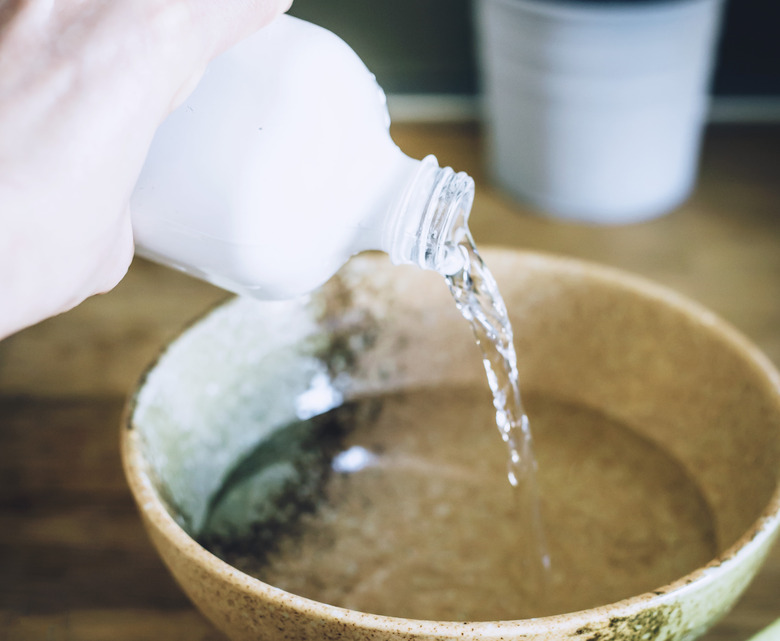Ethanol Vs. Isopropyl Alcohol To Disinfect
Warning
The National Capital Poison Center states, "Rubbing alcohol looks like water. Only small amounts are poisonous to children. It is also poisonous to adults, who sometimes substitute rubbing alcohol for drinking alcohol. Rubbing alcohol can also be toxic when inhaled. It should be used in a well-ventilated area. In addition, because it is flammable, it should always be kept away from open flame."
If you are worried about rubbing alcohol irritating your skin, you can also use protective gloves.
The CDC states that in the healthcare industry, "alcohol" can be used to refer to two different chemical compounds: ethanol (also known as ethyl alcohol) and isopropyl alcohol. "Ethanol and isopropyl alcohol are similar small molecules that are frequently used in a variety of household and industrial uses," Dr. Eric Lee — who is a medical director of several nursing homes, works in the ER, and is a medical expert for InvigorMedical.com — tells Hunker. "They differ in the location of the alcohol group on their chemical structures. They perform essentially the same function in that they are the primary ingredient in many common over-the-counter hand sanitizers like Purell." He adds that ethanol is also the type of alcohol one would drink.
Rubbing alcohol, according to Dr. Lee, is the household name for a water-based solution that is composed of at least 70% ethanol or isopropyl alcohol. "Rubbing alcohol that contains ethanol is 'denatured,' meaning that toxic substances are added to it to prevent people from drinking it," he states. Both types of alcohol require water to work — the water will open bacterial pores, allowing alcohol to infiltrate the bacterial cells and kill them. Yet, Dr. Lee continues, "It is well known that both alcohols are effective at killing bacteria. However, what is less clear, is whether or not killing those bacteria prevents human disease." In fact, earlier this year, Dr. Lee reveals that Gojo Industries, the maker of Purell, had to change their marketing because the FDA banned them from calling their product one that "kills disease-causing germs." Essentially, both alcohols can be used for disinfection purposes — it's simply not known if their results prevent human disease. As a result, Dr. Lee prefers dilute bleach.
In terms of the topical coronavirus, the CDC does state that alcohol solutions with at least 70% alcohol should be effective when it comes to disinfection of the virus. "Generally speaking, it works well for the virus," Dr. Shuhan He, an Emergency Medicine physician at the Harvard Teaching Hospital Affiliate, Massachusetts General Hospital, tells Hunker. However, in their Chemical Disinfectants guidelines, the CDC writes, "Alcohols are not recommended for sterilizing medical and surgical materials principally because they lack sporicidal action and they cannot penetrate protein-rich materials." You might also want to use rubbing alcohol for cleansing a minor wound, and while you can (following instructions on the product), there is concern that the liquid will damage the healthy tissue surrounding the wound. Instead, Dr. Lee recommends soap and water.
With regard to hand sanitizers, when speaking of ethanol and isopropyl alcohol, Dr. He states, "Both have been shown to work in homemade hand sanitizer. If you make 10L of hand sanitizer at home, 7L of isopropyl alcohol and 8L of ethanol would do." He cites the World Health Organization's guide for making hand sanitizer, with both types of alcohol, at home. The CDC seconds that this type of hand sanitizer can be used to prevent the coronavirus, but specifically states, "If soap and water are not available and hands are not visibly dirty, an alcohol-based hand sanitizer that contains at least 60% alcohol may be used. However, if hands are visibly dirty, always wash hands with soap and water."
Ultimately, both types of alcohol can be used to disinfect, but there are other methods one might prefer to use. As always, no matter which material you choose, make sure to do so following proper safety procedures.
